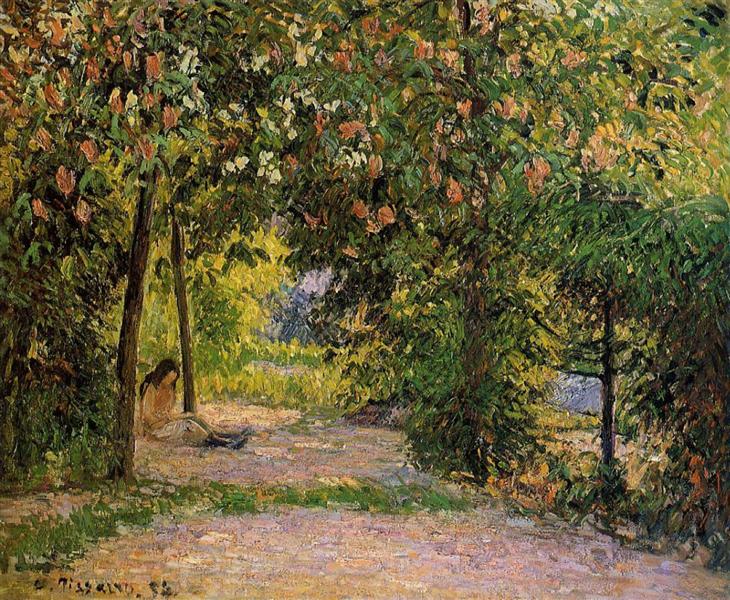תיאור
Camille Pissarro's "The Garden in Spring - Eragny - 1894" is a gem that encapsulates the essence of Impressionism, a movement of which Pissarro was one of its most valuable exponents. This painting, created during a fertile period both in the artist's personal life and in his career, reflects not only his technical mastery, but also his deep appreciation for nature and the everyday life that surrounded him.
At first glance, the composition of the work presents itself as a vibrant celebration of spring, a recurring theme in Pissarro’s work, who often found his inspiration in the landscapes and gardens that surrounded him in Eragny, a town in Normandy where he settled. The painting is characterized by a rich and luminous palette that evokes the freshness of the garden in full bloom. Greenish tones predominate in the foliage, punctuated by the warm colors of the flowers that seem to dance in the spring breeze. This chromatic choice not only highlights the vitality of the scene, but also reflects the influence of the impressionist point of view, where the capture of light is paramount.
The perspective and arrangement of elements in the painting reveal a sense of organization that contrasts with the apparent spontaneity of the landscape. Pissarro employs a loose, rapid brushstroke technique that brings the details of the garden to life, from the flowers to the dense foliage, suggesting movement and liveliness. This style, characteristic of Impressionism, translates into an almost sensorial interpretation of space, transforming the garden into a place where the viewer can almost feel the warmth of the sun and the murmur of nature.
Figures emerge from the scene, though blurred and imprecise, adding to the visual narrative. A woman, perhaps a familiar figure from the domestic environment, stands at the centre of the work, captivating the viewer's attention. Her posture and the gesture of her body suggest an intimate connection with the garden, a reflection of the everyday life that Pissarro loved to depict. The image of the woman, though not the sole focus of the painting, becomes a bridge between the viewer and nature, a reminder of the human relationship with the environment.
As you look more closely, you can see subtle nuances in the brushstroke technique. Influenced by contemporaries such as Monet and Cézanne, Pissarro layers color that create depth and textures that simulate the density of foliage and the lightness of flowers. This approach not only illustrates his painterly technique, but also his constant quest to depict the reality of light and atmosphere surrounding his world, making each image tell a visceral story.
The significance of The Garden in Spring goes beyond mere visual delight; it is a testament to Camille Pissarro's mastery in capturing the surroundings, inviting the viewer to immerse themselves in a specific moment in time. This canvas is not only a representation of the garden in spring; it is a poetic exploration of rural life, a song to nature and the small joys found in everyday life.
Thus, this work stands as a fundamental piece that highlights Pissarro's ability to capture the essence of a moment, a garden full of life and color that continues to resonate in the viewer's heart, connecting them with the beauty of the simple things that we often dismiss. The painting is not only a manifestation of sublime technique; it is an emotional legacy that invites contemplation and admiration, showing the depth of an artist who dared to celebrate life itself.
KUADROS ©, a famous painting on your wall.
Hand-made oil painting reproductions, with the quality of professional artists and the distinctive seal of KUADROS ©.
Painting reproduction service with satisfaction guarantee. If you are not completely satisfied with the replica of your painting, we will refund 100% of your money.

